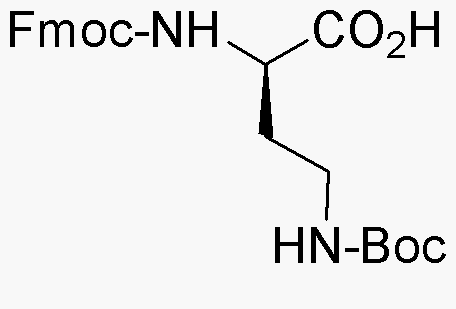Na-Fmoc-Ng-Boc-D-2,4-diaminobutyric acid is widely utilized in research focused on:
- Peptide Synthesis: This compound serves as a protecting group for amino acids, facilitating the synthesis of peptides in a controlled manner. Its stability under various conditions makes it a preferred choice for researchers in organic chemistry.
- Drug Development: In pharmaceutical research, it plays a crucial role in designing new drugs, particularly those targeting specific biological pathways. Its ability to modify amino acids allows for the creation of more effective therapeutic agents.
- Bioconjugation: This chemical is used in bioconjugation processes to attach biomolecules to drugs or imaging agents, enhancing their specificity and efficacy in targeted therapies.
- Protein Engineering: Researchers utilize this compound to modify proteins, improving their stability and functionality. This application is particularly relevant in the development of enzyme inhibitors and therapeutic proteins.
- Research in Cancer Therapy: Its applications extend to cancer research, where it aids in the development of targeted treatments that can selectively attack cancer cells while minimizing damage to healthy tissues.
General Information
Properties
Safety and Regulations
Applications
Na-Fmoc-Ng-Boc-D-2,4-diaminobutyric acid is widely utilized in research focused on:
- Peptide Synthesis: This compound serves as a protecting group for amino acids, facilitating the synthesis of peptides in a controlled manner. Its stability under various conditions makes it a preferred choice for researchers in organic chemistry.
- Drug Development: In pharmaceutical research, it plays a crucial role in designing new drugs, particularly those targeting specific biological pathways. Its ability to modify amino acids allows for the creation of more effective therapeutic agents.
- Bioconjugation: This chemical is used in bioconjugation processes to attach biomolecules to drugs or imaging agents, enhancing their specificity and efficacy in targeted therapies.
- Protein Engineering: Researchers utilize this compound to modify proteins, improving their stability and functionality. This application is particularly relevant in the development of enzyme inhibitors and therapeutic proteins.
- Research in Cancer Therapy: Its applications extend to cancer research, where it aids in the development of targeted treatments that can selectively attack cancer cells while minimizing damage to healthy tissues.
Documents
Safety Data Sheets (SDS)
The SDS provides comprehensive safety information on handling, storage, and disposal of the product.
Product Specification (PS)
The PS provides a comprehensive breakdown of the product’s properties, including chemical composition, physical state, purity, and storage requirements. It also details acceptable quality ranges and the product's intended applications.
Certificates of Analysis (COA)
Search for Certificates of Analysis (COA) by entering the products Lot Number. Lot and Batch Numbers can be found on a product’s label following the words ‘Lot’ or ‘Batch’.
*Catalog Number
*Lot Number
Certificates Of Origin (COO)
This COO confirms the country where the product was manufactured, and also details the materials and components used in it and whether it is derived from natural, synthetic, or other specific sources. This certificate may be required for customs, trade, and regulatory compliance.
*Catalog Number
*Lot Number
Safety Data Sheets (SDS)
The SDS provides comprehensive safety information on handling, storage, and disposal of the product.
DownloadProduct Specification (PS)
The PS provides a comprehensive breakdown of the product’s properties, including chemical composition, physical state, purity, and storage requirements. It also details acceptable quality ranges and the product's intended applications.
DownloadCertificates of Analysis (COA)
Search for Certificates of Analysis (COA) by entering the products Lot Number. Lot and Batch Numbers can be found on a product’s label following the words ‘Lot’ or ‘Batch’.
*Catalog Number
*Lot Number
Certificates Of Origin (COO)
This COO confirms the country where the product was manufactured, and also details the materials and components used in it and whether it is derived from natural, synthetic, or other specific sources. This certificate may be required for customs, trade, and regulatory compliance.


